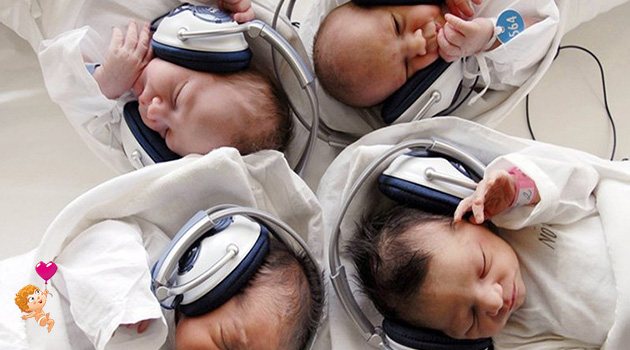Number of views: 2,882
Good music plays a big role in the development of a child’s intelligence and emotional makeup. The results of numerous studies prove that classical music beneficial for children . It stimulates brain function, promotes the development of creativity, and improves communication skills. Classical works are very different, some are more suitable for an adult audience, others are recommended for the youngest listeners. Most of the melodies have a beneficial effect on music lovers of all ages.
Pregnant women who listened to classical music say that the baby in the womb begins to calm down, and the mother’s well-being improves. Doctors note that women who prefer the classics have healthy children much more often.
Read in the blog: “Classical music for children: BABY CONCERT “Music of Your Heart””
The “magical” effect of music on children
As a result of numerous studies, it has been scientifically established that music actually contributes to more active development of children. Many mothers practice music therapy even for babies still in the womb. Of course, a child begins to perceive the lyrics of songs only at a more mature age, but the ability to recognize a melody to one degree or another is observed even before birth. How exactly does the influence of music manifest itself on the development of children, including preschool children? Among the positive effects of listening to it by your baby are the following:
• Memory improvement . The child remembers the melody and lyrics, and this happens, rather, on a subconscious level.
• Speech formation . By singing along to your favorite songs, your baby trains his articulation skills.
• Music therapy as a way to control the emotional state of a child . Overly active and easily excitable children relax better with calm music. And cheerful and playful melodies will help stir up and invigorate passive kids.
• Development of creative abilities . By listening to music, a child learns to interpret and understand it, which means that the imagination is actively involved in the process.
• Development of writing and mathematical abilities . Surprisingly, regular listening to music also affects a child’s ability to write and count. There is a scientific explanation for this - music develops spatial perception.
Avoid music that has “harmful influences”
If we translate the above into modern language, we get an idea that is absolutely practically applicable, even utilitarian: songs, melodies, harmonies are not a set of sounds, but a special language. Language of emotional expression. And also a means of education. In our context - emotional and moral. And this language must be used skillfully, without leaving things to chance. In other words, the impact of music can be not only positive, but also negative.
It follows that just as there are bans on certain words, for example those calling for national intolerance or violence, there should also be a ban on certain sounds and harmonies. Namely, those that have, in the words of Pythagoras, a “harmful influence” on a person.
And the fact that such sounds and harmonies exist is undoubtedly. It is no coincidence that reinforced police are on duty near the halls where some musical groups perform, for example those performing “hard rock”. After such concerts, the audience, especially young people and teenagers, whose psyche is easily vulnerable and susceptible to the greatest influence, sharply increases aggressiveness.
Another thing is that it is not entirely clear who will implement these bans. It is only clear that these should not be officials, even the most senior ones, but specialists. Psychologists, teachers, musicians.
Sometimes, listening to radio or television programs, one gets the feeling that in Ancient Greece they understood the importance of musical education better than in today's world. Musical classes (listening to music, playing the lyre, cithara, flute, choral singing) have been included in the program of the ancient Greek school since the time of Solon. Ancient Greek teachers, selecting certain pieces of music, tried to develop in young Hellenes such qualities as kindness, straightforwardness, and courage.
What kind of music can children play?
Any musician will tell you that you need to develop your child’s ear for music with the right music. The direction of development of the child’s personality also depends on the choice of musical material. You shouldn't experiment with some styles and genres - you can't expect any usefulness from them. Other directions have a beneficial effect on the child.
Your baby should not include:
• Noisy and too loud music. Sensitive children's ears react very sharply to chaotic house, aggressive heavy metal, hard garage rock, etc. Such music can cause tears and hysterics in the youngest music lovers, and aggression and excess energy in older children. Psychologists do not at all advise adults to play songs for their children in which percussion instruments prevail.
• Songs with obscene language . The lyrics of many compositions contain words that even adults try not to use in their speech. Children are not known for their modesty, so they can repeat an obscene expression with a completely calm face. It will be very difficult to wean them from a bad habit.
• Long and too slow compositions . Calm and light music is good, but in moderation. You shouldn’t spend all day playing lyrical ballads that make you sad. Adults may like them, but children still need more dynamic and uplifting music.
Scientists, in an attempt to determine how music affects the development of a child’s personality, came to the following conclusions:
- Children's music therapy sessions should be carried out 2-3 times a day for 20-30 minutes each. The duration can be increased if the baby is inclined to listen to music.
- It is better for a child to listen to relaxing compositions after feeding, and dynamic and cheerful ones - before.
- There is no need to play music loudly—the volume of calm conversation is enough.
- The repertoire can be wide and include children's, pop, jazz, folk songs, etc.
- The child must be introduced to classical music - it is the best means for music therapy. However, there are some nuances here that must be taken into account when conducting “sessions”. For example, it is impossible to compose a repertoire exclusively from classics - it is important to maintain a balance between different musical styles.
Classic helps premature babies

It turned out that classical music is extremely beneficial for babies who gave birth prematurely. This is evidenced by an experiment in which 12 premature infants took part. They were all born at 30 weeks of pregnancy and weighed about 1.2 kilograms.
The children were divided into three groups. The first team listened to the music of Mozart , the second included works by Bach, the third was in silence. Musical sessions lasted half an hour a day, the melodies were selected calm and played quietly.
Doctors monitored the subjects' metabolic rates. It turned out that infants who listened to Mozart had a 9.7% slower metabolic rate compared to those who did not listen to music. The Bach group showed a slowdown of 4.5%. That is, kids who listened to classics gained weight faster and this contributed to their development. Mozart turned out to be the most effective composer for these purposes.
The influence of classical music on children
Not all adults can boast of a love of classical music. Most people find it too boring and difficult to listen to every day. However, child psychologists assure that the influence of classical music on the psyche of children is colossal. Of course, everything is very individual. Some kids, hearing the sounds of an orchestra, throw a tantrum, others become energized or, conversely, completely calm down. The reaction of children depends directly on their temperament, and for each it is necessary to create an individual music program.
The benefits of classical music for children of all ages have been scientifically proven. Regular listening to Mozart, Bach, Chopin and other “golden” composers significantly develops a child’s creative, mental and communication abilities. There is even the so-called “Mozart Effect”, developed by the French otorhinolaryngologist A. Tomatis. It boils down to the fact that children listening to the works of W. A. Mozart demonstrate a more dynamic development of thinking than their peers who do not listen to the music of this composer. The doctor explains this phenomenon with a special tonal sound range, characteristic of the works of Wolfgang Amadeus. Of course, it is too early to talk about a 100% effect, but the fact remains that classical music definitely contributes to a more active mental and creative development of children.
What to listen to?
Masaru Ibuka is sure that children prefer to listen to classical music, no matter how complex it may be, than to children's songs. Why this is so is unknown. But these are the results of the experiment that he conducted in one of the kindergartens. But the main thing is that the music of the classics often causes real delight in children, and even babies kick their legs to the beat. Therefore, play Bach, Mozart and Beethoven for your child and be sure: the child will appreciate it like no one else. From time to time, turn on pieces when the baby is playing. Let it be a quiet sound so that it does not bother the child and does not put too much pressure on the head.
Songs for children
Songs written specifically for young music lovers play a major role in the development of a child’s personality. As a rule, these are simple compositions with easy-to-remember text that take into account the importance of children's creativity and the development of imagination. Listening to such songs, the child gets involved in the process of learning about the vast world of music, turns on his imagination and draws various images. Very often, parents even combine children's music therapy sessions with drawing classes. A child can express his emotions and thoughts while listening to songs on paper using paints.
Analogues of adult musicals—musical fairy tales—are of great interest to children. These can be either audio recordings or musical cartoons, which are widely represented in the world film collection today. In an easy and accessible form, they talk about simple human values and life wisdom, and instill in children courage, respect for loved ones, justice and kindness. Kids quickly memorize songs from fairy tales, which contributes to the development of memory and speech.
Thus, music greatly helps parents in matters of child upbringing. In addition, if you start music therapy at an early age, the child will definitely develop creative abilities. And then parents will be faced with other questions, for example, how to choose a musical instrument or teach their child to draw.
Should I send my child to a music school?
If at least one of the child’s relatives has a good voice and hearing, then it is quite natural that the child is not deprived of musical abilities. You can verify this by sending your child to a music school. Today it is much more prestigious to teach a child English, rapid reading and writing than to learn music, but music plays an important role in the development of a child’s personality. Perhaps your child will like the choice of instrument that you offer him, or maybe he himself has his eye on a piano or violin. Children often strive to imitate their idols, and if your child’s favorite actor in a film sits in a black tailcoat at the piano and plays a beautiful melody, then the child may become attracted to this instrument and ask you to teach him to play it.
What will a child receive at a music school? First of all, this is musical literacy, aesthetic taste and the concept of beauty. Few children at an early age understand the true meaning of the works of the classics, but they try their best to convey them to listeners. The child learns to hear the subtlest changes in music, to understand its nuances and mood, and over time he will learn to hear these changes in human speech - to notice the slightest changes in the mother’s intonation or the teacher’s unnoticeable dissatisfaction. With the help of music, a child learns to communicate with people, to capture the mood of the interlocutor, his emotional state. In addition, the influence of music on a child’s development is undeniable in the development of perseverance, patience, and systematic work.
Read also
Sleeping together with your child: arguments for and against, how to teach your baby to sleep separately?
However, it would be a mistake to think that if you send your child to a music school, he will immediately become diligent and sensual. Many children don’t even last a year in music school because they are bored there, they need to learn a lot of terms they don’t understand, understand them, and repeat the same melodies at home day after day. So if your child resists such teachings, do not scold him, because not everyone grows up to be famous musicians; for many, musical education simply gives another page of variety in life, and nothing more.











